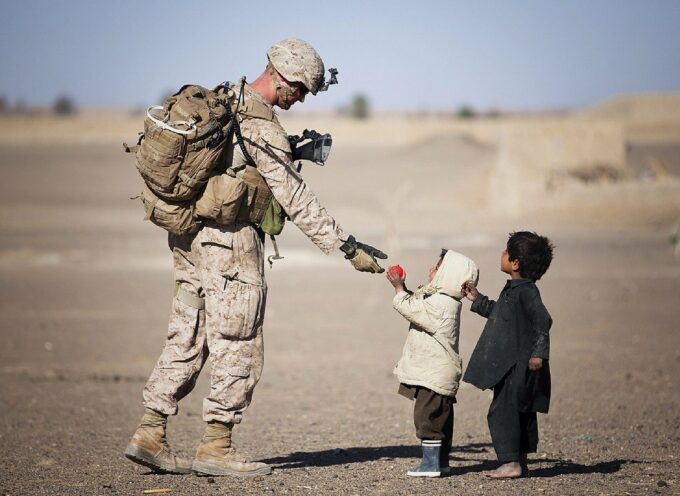The first two decades of the twenty-first century have been rife with war and threats of war. Jihadist-related deaths have increased from an average of roughly 2,500 innocents per year from 2001 to 2006 to a peak of 44,000 in 2014. ISIS waged deadly attacks and genocidal missions across Africa, Asia, and Europe. Russia invaded Ukraine and annexed Crimea. The Syrian civil war has served as a proxy war involving Russia, Iran, Turkey, Saudi Arabia, Qatar, and the United States.
Powerful nations such as China and Russia will probably continue to foster proxy wars with the United States. Less powerful nations, such as Iran, will probably continue to wage surrogate wars with the United States and our allies via terrorist organizations such as Hezbollah. Thus, with warfare and conflict ever-present, it is necessary for the citizens and leaders of the United States to think clearly about when it is, and is not, justified in waging war.
Fortunately, for thousands of years now, the just war tradition (JWT) has been articulating, developing, and refining a set of criteria by which a nation can determine whether or not it is morally justified in waging war. The three core criteria are referred to as traditionally are “just cause,” “legitimate authority,” and “right intent.” Yet, as I will argue, five other criteria flow from those three: “comparative justice,” “probability of success,” “proportionality of projected results,” “last resort,” and “right spirit.” I will outline each criterion briefly.
Just Cause
The first principle is just cause. According to this criterion, a nation must have a morally just reason for entering into a state of war. It may enter into war only if it is responding to a specific act of injustice. Just cause may include responses to the military aggression of a foreign nation, the protection of innocent human life, the restoration of human rights, or the restoration of a just international order.
Legitimate Authority
The second principle, legitimate authority, states that a war is just only if the decision to go to war was made by the political leader or civil body ultimately responsible for the maintaining order and providing security. The essential distinction, as A.J. Coates has argued, is not between state and non-state actors but between public and private use of force. For example, the American Revolution was justified on the basis of communal authority and lower-level magistrates. Legitimate authority, therefore, is both a negative principle that restrains illegitimate actors from the private use of force and a positive principle empowering legitimate authorities in the public use of force.
Right Intent
The third principle, right intent, states that a just war is one waged with morally upright intentions, which is to say that its purpose is to restore a previous state of peace. In other words, a just war is one which pursues a humane and just civic order. A war is not just if its purpose is to glorify one’s nation, enlarge one’s territory, humiliate one’s enemy, or “practice” warfighting in order to keep one’s military fit. If right intent is ignored, all other criteria are corrupted.
Comparative Justice
The fourth principle, comparative justice, is related to just cause. It states that a nation wages war justly only if the moral merit on its side clearly outweighs the moral merit on the side of the opposing nation. As a principle, comparative justice opposes crusaderism/jihadism/militarism which operates without sufficient moral restraint, but also opposes moral skepticism which thinks we are unable to arrive at firm moral judgments.
Last Resort
The fifth principle, last resort, states that a war is jut only if all realistic nonviolent options have been considered in principle and exhausted. After all, if a nation has right intent, its ultimate goal is to restore a previously existing state of law and order. And if that can be achieved without going to war, all the better. It is important to note that the criterion of last resort does not state that a nation must delay war perpetually or exhaust all unrealistic nonviolent options, only that a good faith effort has been made to avoid war.
Probability of Success
The sixth principle, probability of success, states that no war may be justified if the attempt to win the war would clearly be futile. The great ethicist of war, Francisco Suárez wrote, “A prince [who declares war]… ought to balance the expectation of victory against the risk of loss, and ascertain whether, all things being carefully considered, the expectation [of victory] is preponderant.” Thus, political and military leaders must work in unison to determine whether their nation’s forces have a realistic chance of victory. This criterion restrains idealistic or narcissistic leaders who would wage war without any care for the slaughter of its warfighters.
Proportionality of Projected Results
The seventh principle, proportionality of projected results, states that a just war is one in which the good a nation expects to achieve upon winning a war must be greater than estimates of what it will cost to achieve it (e.g. loss of life and property). The late medieval ethicist of war, Francisco de Vitoria, wrote, “No war is just the conduct of which is manifestly more harmful to the State than it is good and advantageous.” This criterion restrains nations from going to war when the victory would cost more than non-engagement would have cost.
Right Spirit
The principle of right spirit focuses on the disposition one maintains as one considers going to war. It states that a just war is one which should be waged with regret rather than with glee or hatred. Using lethal force against enemy soldiers is regrettable even when morally justified. “Given the horrors of war,” Coates writes, “a just recourse to war should be marked by extreme reluctance and a sense of moral tragedy and foreboding.” This criterion reflects the fact that war is sometimes necessary and, even when so, it is always a tragic necessity.
Ancient Principles for Modern Decisions about War and Peace
Through these eight principles, the just war tradition (JWT) helps a nation’s political leaders, military commanders, ethicists, and citizens determine whether or not a nation is morally justified in waging war. Consider the United States. Our Laws of Land Warfare (LLW) and Rules of Engagement (ROE) arise out of the JWT. Like other nations, our nation has a spotty track record in adhering to JWT principles. Yet, JWT principles have constrained, guided, and encouraged our leaders in the past and they should continue to do so in upcoming years.
[Note: I am indebted to my former professor, Daniel Heimbach, for introducing me to these criteria. Dr. Heimbach served in the Navy before becoming an adviser to Bush 41. My conception and articulation of these criteria arises out of my interaction with him and his lecture notes.]
Other Articles in the “Ethics of Warfare” Series
1. To Fight or Not to Fight? That is the Question.
2. What Kind of Peace Should America Seek in our War-Torn Era?
3. Why I am Peaceful but Not a Pacifist
5. Why I am a Proponent of the Just War Tradition
6. The “Founding Fathers” of the Just War Tradition
7. Seven All-Stars of the Just War Tradition
8. Eight Recent Champions of the Just War Tradition
9. 8 Criteria for Deciding When It’s Right to Go to War
10. 7 Moral Criteria to Guide Commanders during Battle
11. How Do Just War Principles Apply to Terrorism & Asymmetrical Warfare?
12. How Do Just War Principles Apply to Drone Warfare?
13. Future War: How do We Prepare Ethically for Radically New Forms of Warfare on the Horizon?
14. The Ethics of Special Operations Warfighting
Subscribe
Never miss a post! Have all new posts delivered straight to your inbox.







